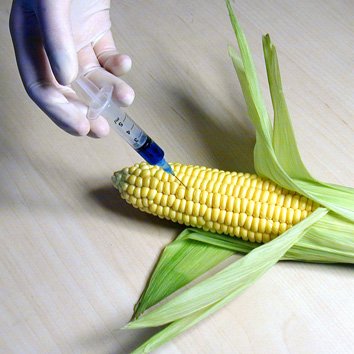 With all the television “make-over” shows it seems apt to discuss the genetic make-over that many more of our foods are set to undergo.
With all the television “make-over” shows it seems apt to discuss the genetic make-over that many more of our foods are set to undergo.
According to the Age Newspaper a Federal Government report stated AUSTRALIAN farmers should be allowed to plant genetically modified GM crops as soon as possible so they can compete with the rest of the world.
If the old adage of “we are what we eat” is true, perhaps it’s time to consider the ethics behind what were eating. Image if you will for a moment, apple seeds or wheat grain that is modified in a laboratory. GM is a special set of technologies that alter the genetic makeup of such living organisms as animals, plants, or bacteria. These modified plants will now supposedly be – disease and drought resistant, and the instant economic gain for the government and many of our struggling farmers is too great.
As the apple tree grows it is sprayed with an array of chemicals and pesticides and it is then artificially treated to make it more appealing to the eye. Apples for example are made bigger, firmer, rounder, more uniform and juicier. When these apples reach a point of sale they are so red and shiny, such pure eye candy that we forget they are laden with chemicals.
Surely something that looks so good, would also taste good? Most of us now have fallen for the lure and quickly realise that the flavour and texture is as artificial as it looks.
The quality of food we eat comes from the quality of food our food eats.
While the short term appeal for large-quantity yielding crops is obviously high, the long term possible environmental impact (not to mention health affects) are frightening. Also then raising the moral issue of how our yearning for instant gratification impacts the environment and ultimately our children’s future.
Planting GM food crops is banned in all states except Queensland. The ban is due to expire in Victoria and NSW early next year and is currently under review. With the strong backing of farming groups and the CSIRO, both Victoria and NSW are widely expected to lift the ban.
Federal Agriculture Minister Peter McGauran, is leading the push to have GM crops widely introduced across Australia. The report said, genetically modified crops pose no danger to human health or the environment and should be given the green light. Makes you wonder just how deeply they investigated the matter, doesn’t it!?!
Experts and environmentalists say GM foods — dubbed “Frankenfoods” by the media — are in fact detrimental to human health and to the environment, and most of the risks are not yet understood.
Here’s what some of the eminent scientist’s say; Professor Richard Lacey, microbiologist, medical doctor, and Professor of Food Safety at Leeds University has become one of the best-known figures of food science since his prediction of the BSE (mad cow disease) crisis more than seven years ago. Recently Professor Lacey has spoken out strongly against the introduction of genetically engineered foods, because of ‘the essentially unlimited health risks’ — “The fact is, it is virtually impossible to even conceive of a testing procedure to assess the health effects of genetically engineered foods when introduced into the food chain, nor is there any valid nutritional or public interest reason for their introduction.”
Dr Joseph Cummins, Professor Emeritus of Genetics at the University of Western Ontario warns: “Probably the greatest threat from genetically altered crops is the insertion of modified virus and insect virus genes into crops. It has been shown in the laboratory that genetic recombination will create highly virulent new viruses from such constructions. Certainly the widely used cauliflower mosaic virus is a potentially dangerous gene. It is a pararetrovirus meaning that it multiplies by making DNA from RNA messages. It is very similar to the Hepatitis B virus and related to HIV. Modified viruses could cause famine by destroying crops or cause human and animal diseases of tremendous power.” Professor Dennis Parke of University of Surrey School of Biological Sciences, a former chief advisor on food safety to Unilever Corporation and British advisor to the US FDA on safety aspects of biotechnology writes: “In 1983, hundreds of people in Spain died after consuming adulterated rapeseed oil. This adulterated rapeseed oil was not toxic to rats”. Dr Parke warns that current testing procedures for genetically altered foods including rodent tests are not proving their safety for humans. He has suggested a moratorium on the release of genetically engineered organisms, foods, and medicines.
Australian Institute of Health and Environmental Research director Judy Carman, an epidemiologist and senior lecturer at the University of Adelaide, said a number of studies had shown that rats fed a diet of genetically modified canola had recorded increases in their liver weights of about 16 per cent.
Greenpeace Australia spokeswoman Louise Sales said she was alarmed. “They (GM crops) lead to the creation of even stronger weeds, which require even stronger pesticides,” she said.
As parents we need to see the truth behind the lies, see the eye candy for what it really is. We need to support traditional farming methods or ideally if your’e able to re-work your budget, prioritise organic products. With this you are offering yourself, your children and the environment a real gift.


 With all the television “make-over” shows it seems apt to discuss the genetic make-over that many more of our foods are set to undergo.
With all the television “make-over” shows it seems apt to discuss the genetic make-over that many more of our foods are set to undergo.
